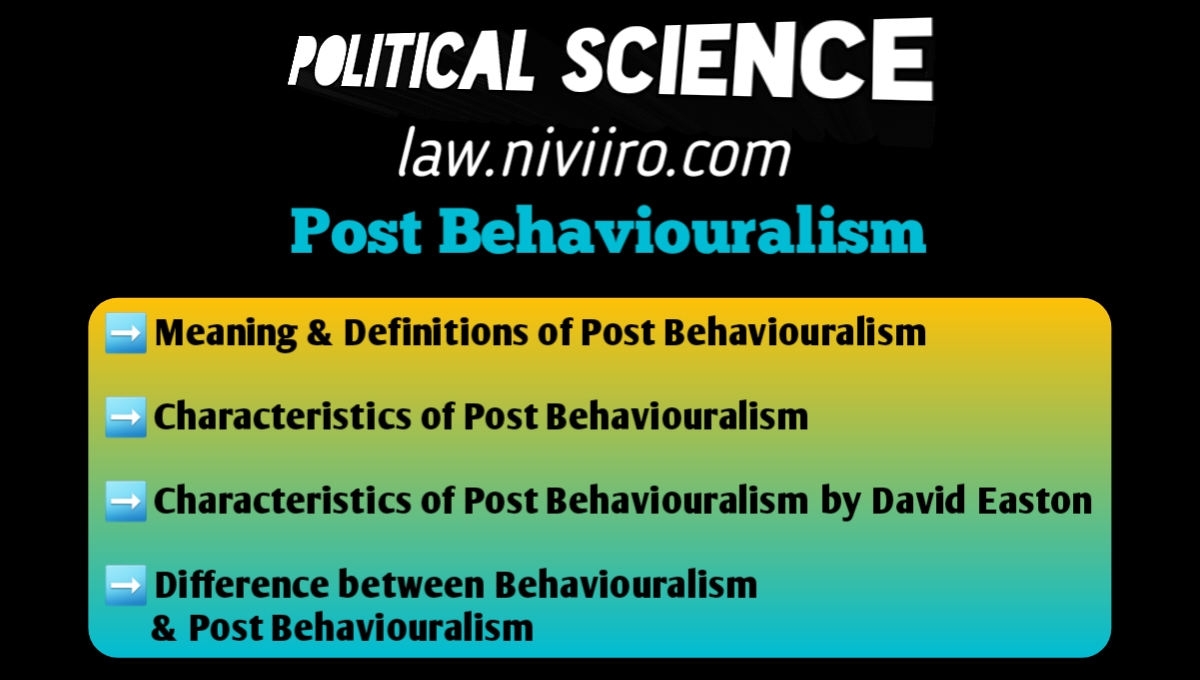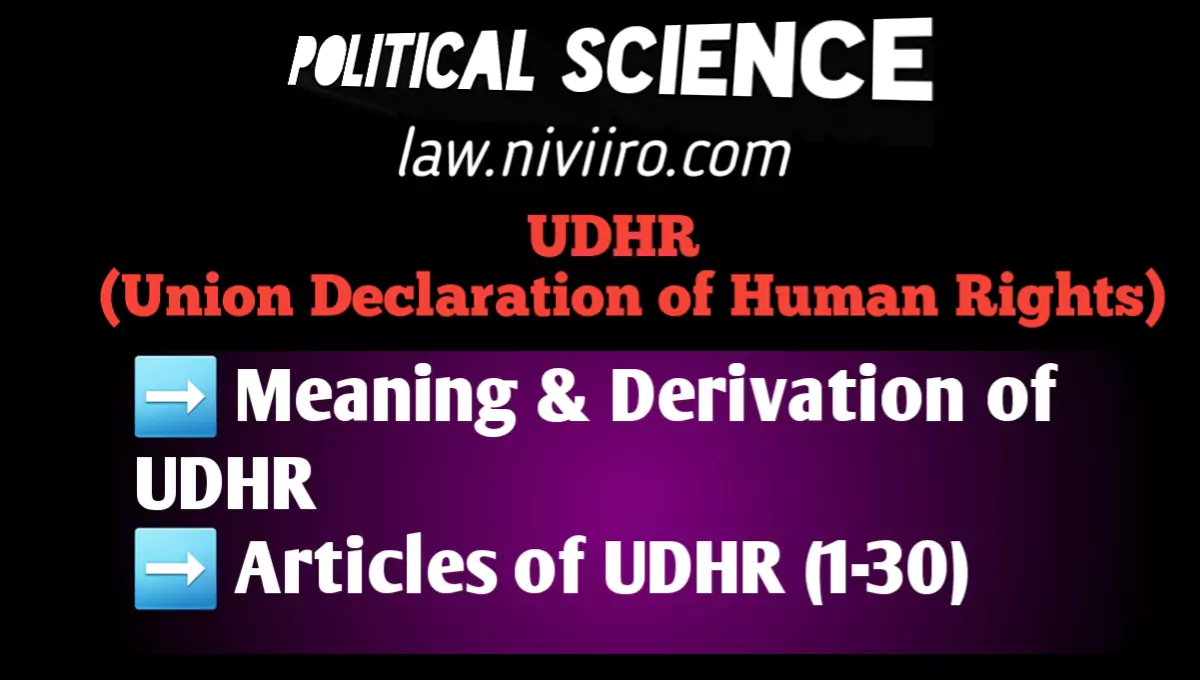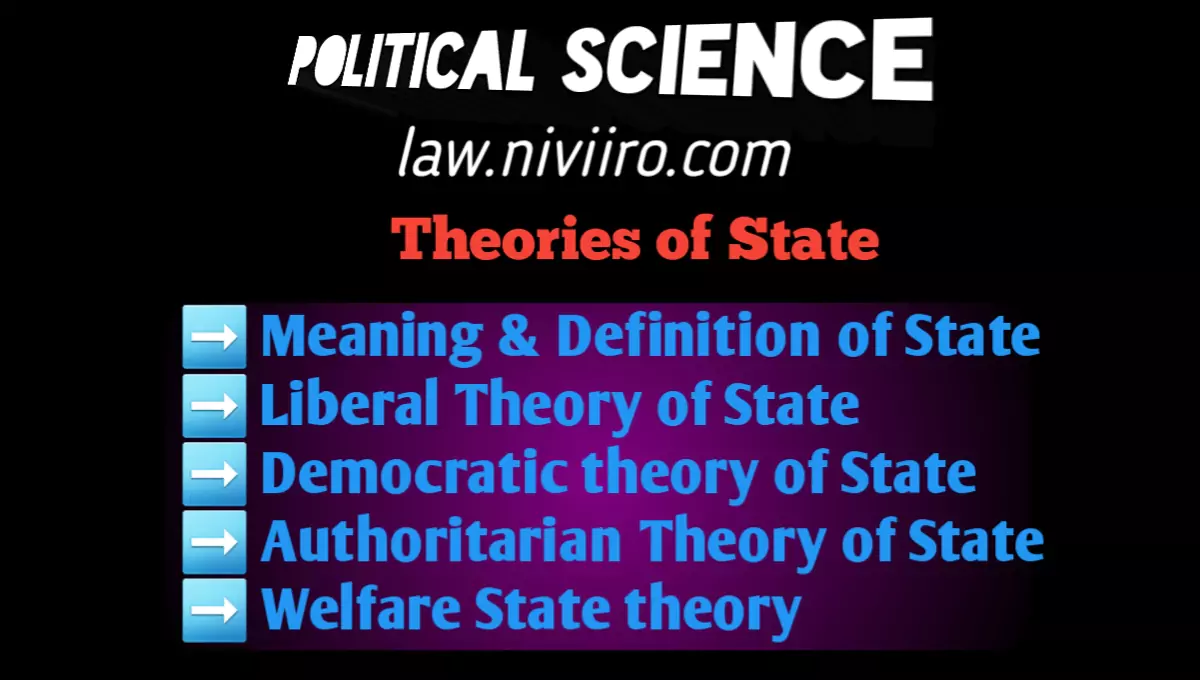Behaviouralism arose as a revolution, and like all revolutions, it could only retain true ground for a limited period. Within twenty years, right from early sixties, there appeared several cracks among the behaviouralists and many of them started advocating the need for reforms. While almost none of them called for the rejection of Behaviouralism, they all accepted and advocated for the necessity to move away from orthodoxy and toward the future.
For this, they agreed that it was necessary to consider both the findings of behavioural research and the limitations of Behaviouralism. Political scientists who embraced Behaviouralism but desired to modify it became known as Post Behaviouralists, and their ideas as Post-Behaviouralism.
Grounds for the Emergence of Post Behaviouralism
1. David Easton argues the failure of behaviouralism
David Easton, one of the founders of the behaviouralist school of thought, became disillusioned with behavioralism, which dominated Political Science from the mid-1950s to the late 1960s. In his presidential presentation to the Annual Convention of the American Political Science Association conducted in 1969, Easton claimed that “he felt unhappy with the political research and instruction made under the impact of behaviouralism.
The behavioural approach attempted to transform the study of politics into a discipline based on natural science techniques. Mathematics was making inroads into political science to the point where it began to resemble mathematics rather than a study concerned with the facts of social life. The behaviouralists had moved away from the realities of social behaviour in their analysis and application of scientific methodologies. As a result, political science has lost contact with the current and contemporary world”.
2. Dissatisfaction with behaviouralism led to the growth of Post- behaviouralism
People quickly became dissatisfied with behavioralism, which failed to solve any practical problem in the world despite investing crores of rupees on research to develop new methodologies and procedures. As a result, post-behavioralism evolved as a reaction to behaviourism.
3. Failure of behaviouralism to look to the practical problems of the world
While behaviouralism was a movement against traditionalism, the post- behaviouralism was also a movement against behaviouralism itself but instead of condemning either of the two methods of thought, it was a synthesis between the two contending schools of thought. Behaviouralism was not a new discipline, but rather a new technique, a new strategy, with a new focus for the study of political science.
Traditional approaches, such as philosophical, historical, and institutional, were unconcerned with human behaviour or group behaviour, and they ignored scientific examination of human problems. As a result, the people, while initially welcomed, discovered that it had failed to tackle any global concern, such as the threat of nuclear war, starvation, poverty, sickness, and so on. As a result, post-behaviouralism rose against it.
4. Failure of the behaviouralists to convert Political Science into a problem solving science
The behavioralists devoted themselves to developing diverse paradigms, conceptual frameworks, models, theories, and metatheories, but they accomplished nothing to address the world’s social, political, economic, and cultural crises.
The post-behaviouralists questioned the value of behavioural research when it failed to account for acute social ills and the growing dangers of nuclear and thermo-nuclear war. They maintained that having high technical capabilities and sophisticated research methods was pointless if political scientists were unable to understand modern social and political challenges.
5. Over-emphasis of the Behaviouralists on research methods and tools
Behaviouralism was eager to establish new research methods and tools for studying political events so that, like natural science, theories might be developed in political science, but in their attempts, they separated political science from philosophy, history, and law. The behaviouralists completely lost touch with life’s reality as time passed. Consequently. Right-thinking behavioralists such as David Easton saw that they were wasting their valuable time solely developing methodological procedures and perfecting their study tools.
Meaning & Definition of Post Behaviouralism
Post-behaviourlism was a reform movement and as such it tried to remove the drawbacks of the behaviouralists which had come to light in actual conduct of their research, which was different from the objectives with which it started.
S.P Verma, writes, “Post behaviourism should not be confused with traditionalism, though both are highly critical of behaviourlism. The difference between the approaches lies in the fact that whereas traditionalism denied the validity of behavioural approach and reiterated its faith in the classical traditions of political science, the post-behaviouralists accepted the achievements of the behavioural era but sought to push political science farther and towards new horizons”.
According to David Easton, “Post-behaviouralism is future-oriented, seeking to propel political science in new directions, and to add rather than to deny its past heritage. It is a genuine revolution, not reaction; a becoming, not a preservation; a reform not a counter-reformation.”
Characteristics or Features of Post Behaviouralism
The characteristics of post-behaviouralism are the following.
(1) Opposition to value-free social science
The post-behaviouralists are deadly hostile to the endeavours of the behaviouralists in making Political Science as value-free science. According to David Easton: “The study of politics was inextricably linked to research into and constructive development of values.
Despite assertions to the contrary, science cannot and has never been evaluated neutrally. As a result, in order to comprehend the limits of our knowledge, we must be aware of the value premises on which it is based as well as the alternatives for which this knowledge could be employed “.
(2) A Movement of Protest
The detractors claimed that behaviouralists who boasted about their applicability to actual political problems were disconnected from reality and practised academic detachment. According to David Easton, the mission of intellectuals has been and must continue to be to safeguard human values of civilisation. As a result, behavioralists should focus on it, yet they have completely failed to achieve this goal.
Dwight Waldo also stated: “Political scientists should be more concerned with values, issues of justice, freedom, and equality, and less concerned with political activity. It is irresponsible to continue with academic detachment in the midst of stress, turbulence, and huge disparities. At the very least, political scientists must be concerned with concerns of public policy and political reform.”
As a result, post-behaviouralists argue that Political Science must be relevant to society and must address basic issues such as justice, liberty, equality, democracy, and so on.
(3) Intellectual Movements
It is important to remember that post-behaviouralism is not limited to a specific segment of society. It is a form of intellectual movement and its followers may be found throughout all strata of the society,” in all generations from young graduates to old members of the profession”. Thus, post-behavioralism is both a movement and an intellectual inclination.
(4) Post-behaviouralists look to the future well-being of the society
Though post-behaviouralists prefer the behavioural approach over the traditional approach since it is empirical, they seek to link their research methodologies in developing theories that can solve society’s current and future challenges. In other words, they wish to link behavioralist methodologies and technology to societal well-being in the future.
According to David Easton, “although the post-behavioural revolution appears to be merely another reaction to behaviouralists, it is in reality strikingly different.” The status quo, classicism, and traditionalism were seen as threatened by behavioralism. The post-behavioral revolution, on the other hand, is focused on the future.
Characteristics of Post behaviouralism as given by David Easton
David Easton who formerly outlined eight basic qualities of behaviouralism and dubbed them the “intellectual foundation stones” of the movement, have come out with seven major traits of post-behaviouralism and labelled them as the “Credo of Relevance” or a “distillation of the maximal image”. They can be summed up and applied as follows:
1. Political Science should not be value-free
The behaviouralists emphasised scientism and value-free techniques while completely ignoring the importance of values. People disliked it since all information was based on faulty premises. There is no doubting that values played an important part in political study and were the driving factor behind knowledge.
The ideals could not be ignored in the aftermath of scientific research. The post- behavioralists are adamant that if knowledge is to be used for the right reasons, value must also be restored to its correct place..
2. Substance must have precedence over technique
According to David Easton, substance must take precedence over tactics. It was useful to have advanced investigation tools, but the most crucial aspect was the objective for which these tools were used. It was not worth undertaking scientific research unless it was relevant and significant to current urgent societal concerns. To the behaviouralists’ slogan that it was better to be wrong than ambiguous, the post-behaviouralists counter-slogan that it was better to be vague than non-relevantly exact.
3. Political Scientists must protect humane values of civilization
The post- behaviouralists argue that the political scientists, being intellectuals must protect and promote the humane values of civilization. If political scientists continued to avoid social concerns, they would be reduced to the status of technologists, mechanics for fiddling with society. Under these conditions, they would be unable to claim the privilege of unfettered inquiry and quasi-extraterritorial protection from societal onslaughts.
4. Emphasis should be on social change and not social preservation
The post-behaviouralists say that contemporary political science should focus on social change rather than social preservation, as the behaviouralists did. The behaviouralists had confined themselves solely to the description and analysis of facts, without taking sufficient care to understand these facts in their broader social context, resulting in “an ideology of social conservatism tempered by modest incremental change” in behavioural Political Science.
5. Post-behaviouralism emphasises action in place of contemplative science
The post-behaviouralists say that behaviouralists are unable to separate themselves from action when conducting research. Their research must be put to good use. “To know “as Easton points out, “is to carry the responsibility for action and to act is to engage in remaking society”.
The post-behaviouralists say that while contemplative science was useful in the nineteenth century, when there was a greater moral accord among nations, it was entirely inappropriate in today’s society, which was deeply split over principles and ideology.
They argue that behavioural scientists should pay more attention to action rather than contemplative science.Their entire research should be oriented towards studying the social and political ills of the society and the methods to remove them.
6. Political Science should not lose touch with brute realities of politics
The behaviouralists had become disconnected from the harsh realities of politics. The behaviouralists concentrated on abstraction and analysis. Because of the world’s grave difficulties and threats, political scientists could no longer turn their eyes to the facts of the situation.
Despite its immense riches and technological resources, the Western civilization was mired in escalating societal disputes and deepening worry and anxiety about the future. The crucial question arose: if political scientists did not offer a solution to society’s ills and human needs, what was the point of behavioural scientists’ research?
7. Urgent need to politicise the profession
Once it is acknowledged that political scientists, as intellectuals, have a good role in society. To attain that purpose, it is unavoidable that all professional organisations as well as universities become politicised.
Difference between Behaviouralism & Post behaviouralism
| Behaviouralism | Post-behaviouralism |
| The behaviouralists laid stress on sophistication of research tools and techniques. | The post-beavhiouralists laid emphasis on substance rather than on techniques. |
| They favoured statusquo. | They wanted that political scientists should try to bring social change and participation in revolution as well, if need be. |
| The Behaviouralists favour free value political investigation. | Post-behaviouralists are clear that value free stress is neither possible nor desirable. In fact value is the basis of knowledge and both cannot be separted from each other. |
| They were not in favour of politicisation of a social science discipline. | They feel that politicisation is not only unavoidable but more desirable as well. |
Conclusion
behaviouralists contend that science has some ideal commitments and that behaviouralism shared these ideal commitments. The post-behaviouralists do not embrace the behaviouralists’ thesis. They believe that the behaviouralists’ technical studies and scientific knowledge should not be divorced from the realities of life. It should be tied to important social problems and should try to solve some of them. The goal of political scientists should never be only stability or the preservation of the status quo.
Political scientists’ approaches should be fluid. If the current societal problem is the result of deep social tensions, these conflicts must be resolved.If resolving these issues necessitated dismantling the existing political order, political scientists should make a strong case for it. He should not be satisfied with mere reform recommendations.
Related Post
What are the Grounds for the Emergence of Post-Behaviouralism ?
1. David Easton argues the failure of behaviouralism,
2. Dissatisfaction with behaviouralism led to the growth of Post- behaviouralism
3. Failure of behaviouralism to look to the practical problems of the world….
What is the Meaning & Definition of Post-Behaviouralism ?
Post-behaviourlism was a reform movement and as such it tried to remove the drawbacks of the behaviouralists which had come to light in actual conduct of their research, which was different from the objectives with which it started.
According to David Easton, “Post-behaviouralism is future-oriented, seeking to propel political science in new directions, and to add rather than to deny its past heritage. It is a genuine revolution, not reaction; a becoming, not a preservation; a reform not a counter-reformation.”
What are the Characteristics or Features of Post-Behaviouralism ?
(1) Opposition to value-free social science
The post-behaviouralists are deadly hostile to the endeavours of the behaviouralists in making Political Science as value-free science…..
(2) A Movement of Protest
The detractors claimed that behaviouralists who boasted about their applicability to actual………
(3) Intellectual Movements
It is important to remember that post-behaviouralism is not limited to a specific segment of …….
(4) Post-behaviouralists look to the future well-being of the society
What are the Characteristics of Post-behaviouralism as given by David Easton ?
1. Political Science should not be value-free
The behaviouralists emphasised scientism and value-free techniques while completely ignoring the importance of values. People disliked it since all information was based on faulty premi………..
2. Substance must have precedence over technique
According to David Easton, substance must take precedence over tactics. It was useful to have adv………..
3. Political Scientists must protect humane values of civilization
The post- behaviouralists argue that the political scientists, being intellectuals must protect and pro………
4. Emphasis should be on social change and not social preservation
References
- J.C. Johari, Political Science
- R.C. Agarwal, Political Theory
- Prof. S.L. Verma, Modern Political Theory
- M.P. Jain, Political Theory liberal and Marxiam
- Prof. H.C. Verma, Modern Political Theory
- V.D. Mahajan, Political Theory
Sources

















